The Existence of God: Traditional Ontological Argument and Skepticism
VerifiedAdded on 2023/01/16
|7
|1596
|23
Essay
AI Summary
This essay delves into the traditional ontological argument for the existence of God, initially proposed by St. Anselm. It examines the argument's logical coherence, particularly in light of criticisms from radical skeptics, who question the validity of beliefs beyond sensory experience. The essay further analyzes the viewpoints of epistemic monists, who believe in the unity of all existence as part of God, and epistemic pluralists, who adopt a more holistic approach. It concludes that, while the existence of God cannot be definitively proven, neither can its non-existence, as both sides of the argument are based on different personal experiences and worldviews, making both credible within their respective frameworks. The essay stresses the importance of avoiding the unjust comparison of rationalist perspectives with faith-based beliefs, advocating for a nuanced understanding of the debate.
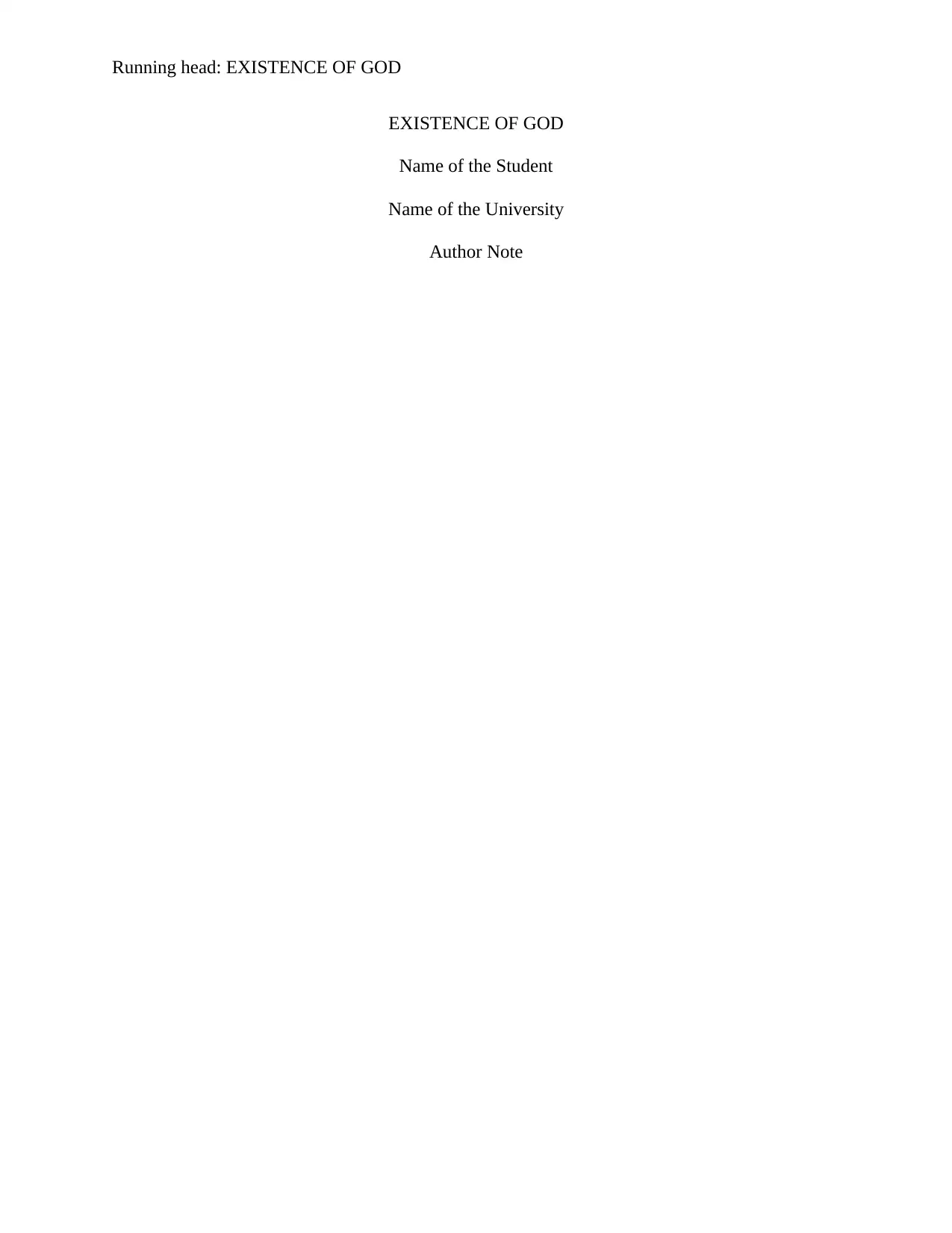
Running head: EXISTENCE OF GOD
EXISTENCE OF GOD
Name of the Student
Name of the University
Author Note
EXISTENCE OF GOD
Name of the Student
Name of the University
Author Note
Paraphrase This Document
Need a fresh take? Get an instant paraphrase of this document with our AI Paraphraser
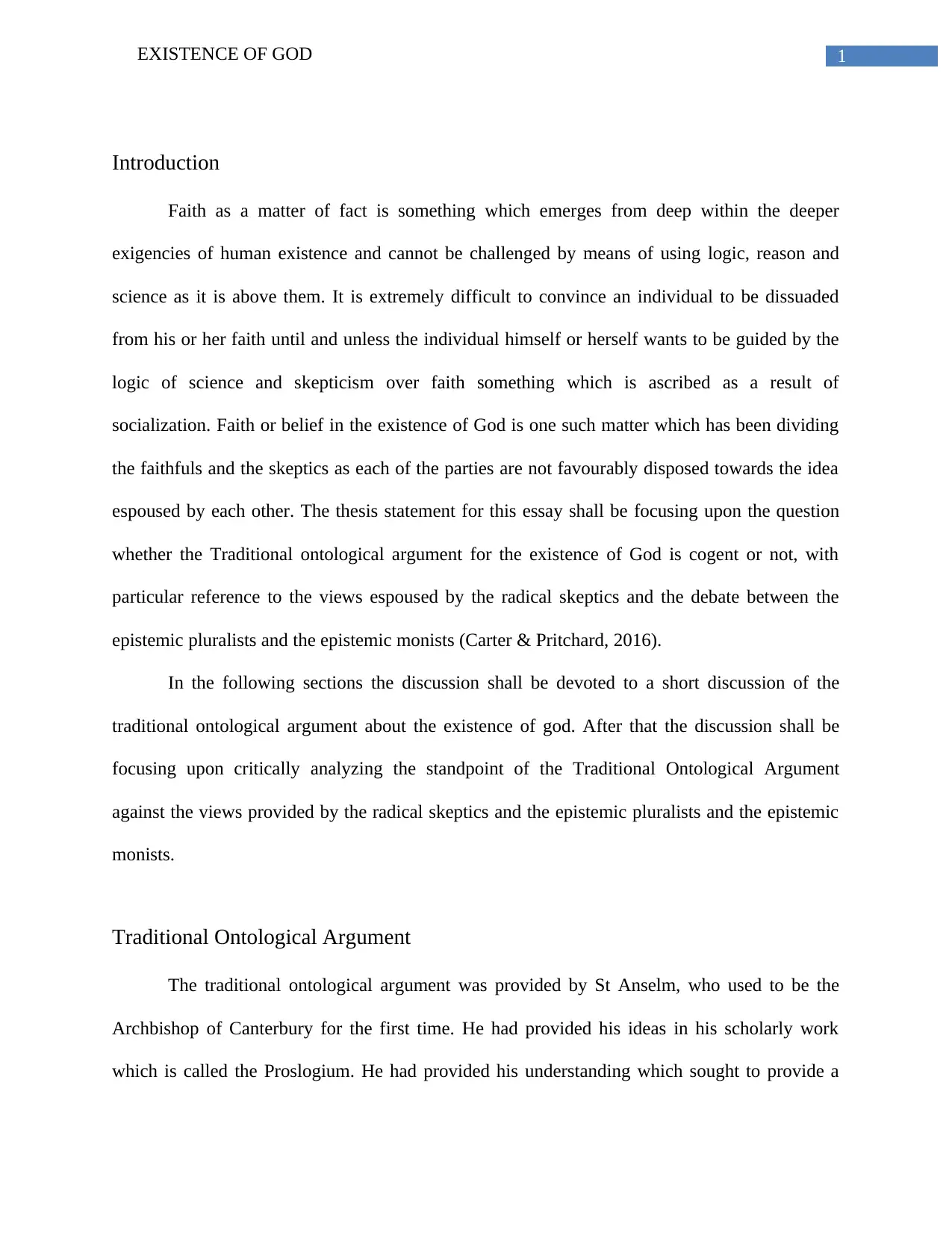
1EXISTENCE OF GOD
Introduction
Faith as a matter of fact is something which emerges from deep within the deeper
exigencies of human existence and cannot be challenged by means of using logic, reason and
science as it is above them. It is extremely difficult to convince an individual to be dissuaded
from his or her faith until and unless the individual himself or herself wants to be guided by the
logic of science and skepticism over faith something which is ascribed as a result of
socialization. Faith or belief in the existence of God is one such matter which has been dividing
the faithfuls and the skeptics as each of the parties are not favourably disposed towards the idea
espoused by each other. The thesis statement for this essay shall be focusing upon the question
whether the Traditional ontological argument for the existence of God is cogent or not, with
particular reference to the views espoused by the radical skeptics and the debate between the
epistemic pluralists and the epistemic monists (Carter & Pritchard, 2016).
In the following sections the discussion shall be devoted to a short discussion of the
traditional ontological argument about the existence of god. After that the discussion shall be
focusing upon critically analyzing the standpoint of the Traditional Ontological Argument
against the views provided by the radical skeptics and the epistemic pluralists and the epistemic
monists.
Traditional Ontological Argument
The traditional ontological argument was provided by St Anselm, who used to be the
Archbishop of Canterbury for the first time. He had provided his ideas in his scholarly work
which is called the Proslogium. He had provided his understanding which sought to provide a
Introduction
Faith as a matter of fact is something which emerges from deep within the deeper
exigencies of human existence and cannot be challenged by means of using logic, reason and
science as it is above them. It is extremely difficult to convince an individual to be dissuaded
from his or her faith until and unless the individual himself or herself wants to be guided by the
logic of science and skepticism over faith something which is ascribed as a result of
socialization. Faith or belief in the existence of God is one such matter which has been dividing
the faithfuls and the skeptics as each of the parties are not favourably disposed towards the idea
espoused by each other. The thesis statement for this essay shall be focusing upon the question
whether the Traditional ontological argument for the existence of God is cogent or not, with
particular reference to the views espoused by the radical skeptics and the debate between the
epistemic pluralists and the epistemic monists (Carter & Pritchard, 2016).
In the following sections the discussion shall be devoted to a short discussion of the
traditional ontological argument about the existence of god. After that the discussion shall be
focusing upon critically analyzing the standpoint of the Traditional Ontological Argument
against the views provided by the radical skeptics and the epistemic pluralists and the epistemic
monists.
Traditional Ontological Argument
The traditional ontological argument was provided by St Anselm, who used to be the
Archbishop of Canterbury for the first time. He had provided his ideas in his scholarly work
which is called the Proslogium. He had provided his understanding which sought to provide a
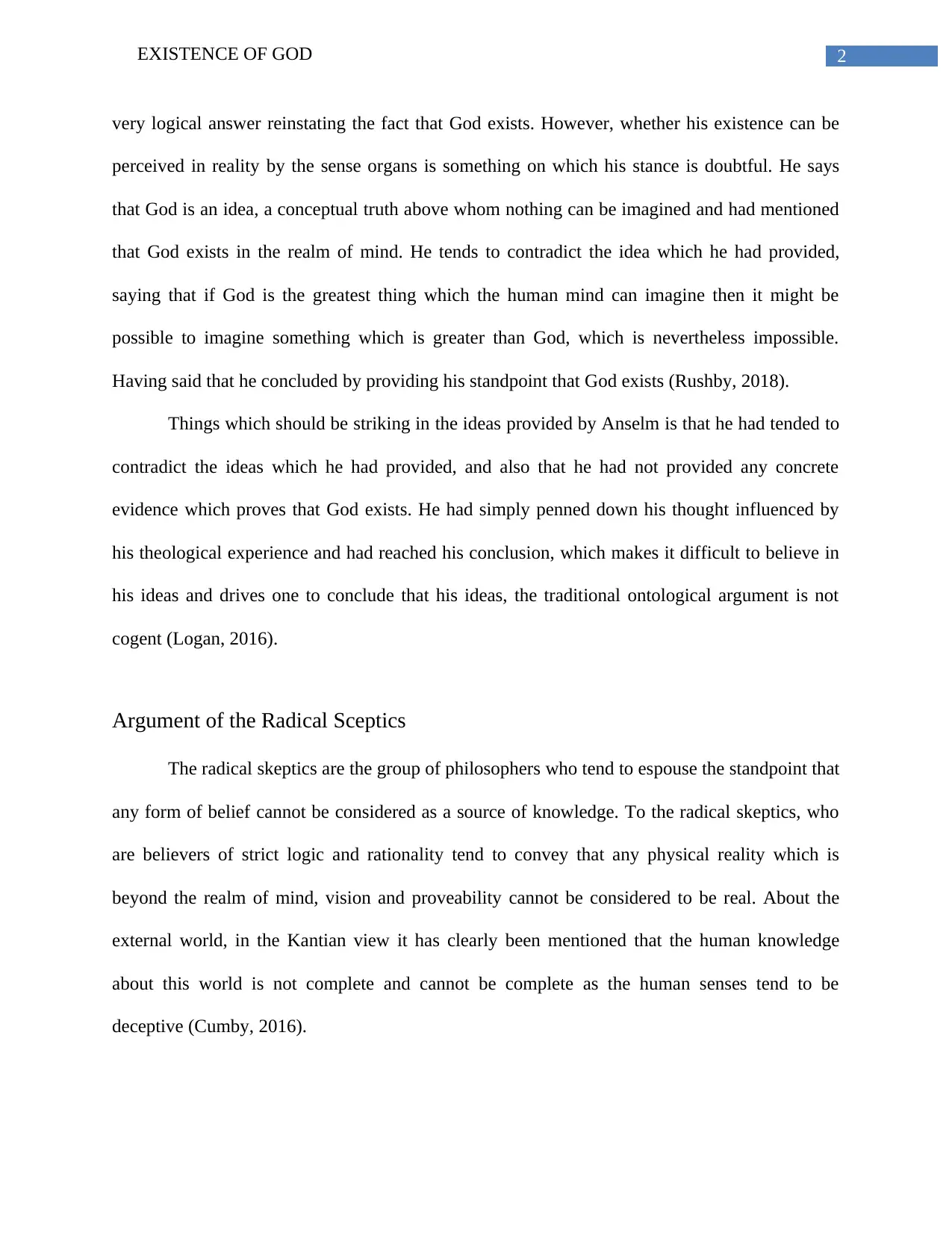
2EXISTENCE OF GOD
very logical answer reinstating the fact that God exists. However, whether his existence can be
perceived in reality by the sense organs is something on which his stance is doubtful. He says
that God is an idea, a conceptual truth above whom nothing can be imagined and had mentioned
that God exists in the realm of mind. He tends to contradict the idea which he had provided,
saying that if God is the greatest thing which the human mind can imagine then it might be
possible to imagine something which is greater than God, which is nevertheless impossible.
Having said that he concluded by providing his standpoint that God exists (Rushby, 2018).
Things which should be striking in the ideas provided by Anselm is that he had tended to
contradict the ideas which he had provided, and also that he had not provided any concrete
evidence which proves that God exists. He had simply penned down his thought influenced by
his theological experience and had reached his conclusion, which makes it difficult to believe in
his ideas and drives one to conclude that his ideas, the traditional ontological argument is not
cogent (Logan, 2016).
Argument of the Radical Sceptics
The radical skeptics are the group of philosophers who tend to espouse the standpoint that
any form of belief cannot be considered as a source of knowledge. To the radical skeptics, who
are believers of strict logic and rationality tend to convey that any physical reality which is
beyond the realm of mind, vision and proveability cannot be considered to be real. About the
external world, in the Kantian view it has clearly been mentioned that the human knowledge
about this world is not complete and cannot be complete as the human senses tend to be
deceptive (Cumby, 2016).
very logical answer reinstating the fact that God exists. However, whether his existence can be
perceived in reality by the sense organs is something on which his stance is doubtful. He says
that God is an idea, a conceptual truth above whom nothing can be imagined and had mentioned
that God exists in the realm of mind. He tends to contradict the idea which he had provided,
saying that if God is the greatest thing which the human mind can imagine then it might be
possible to imagine something which is greater than God, which is nevertheless impossible.
Having said that he concluded by providing his standpoint that God exists (Rushby, 2018).
Things which should be striking in the ideas provided by Anselm is that he had tended to
contradict the ideas which he had provided, and also that he had not provided any concrete
evidence which proves that God exists. He had simply penned down his thought influenced by
his theological experience and had reached his conclusion, which makes it difficult to believe in
his ideas and drives one to conclude that his ideas, the traditional ontological argument is not
cogent (Logan, 2016).
Argument of the Radical Sceptics
The radical skeptics are the group of philosophers who tend to espouse the standpoint that
any form of belief cannot be considered as a source of knowledge. To the radical skeptics, who
are believers of strict logic and rationality tend to convey that any physical reality which is
beyond the realm of mind, vision and proveability cannot be considered to be real. About the
external world, in the Kantian view it has clearly been mentioned that the human knowledge
about this world is not complete and cannot be complete as the human senses tend to be
deceptive (Cumby, 2016).
⊘ This is a preview!⊘
Do you want full access?
Subscribe today to unlock all pages.

Trusted by 1+ million students worldwide
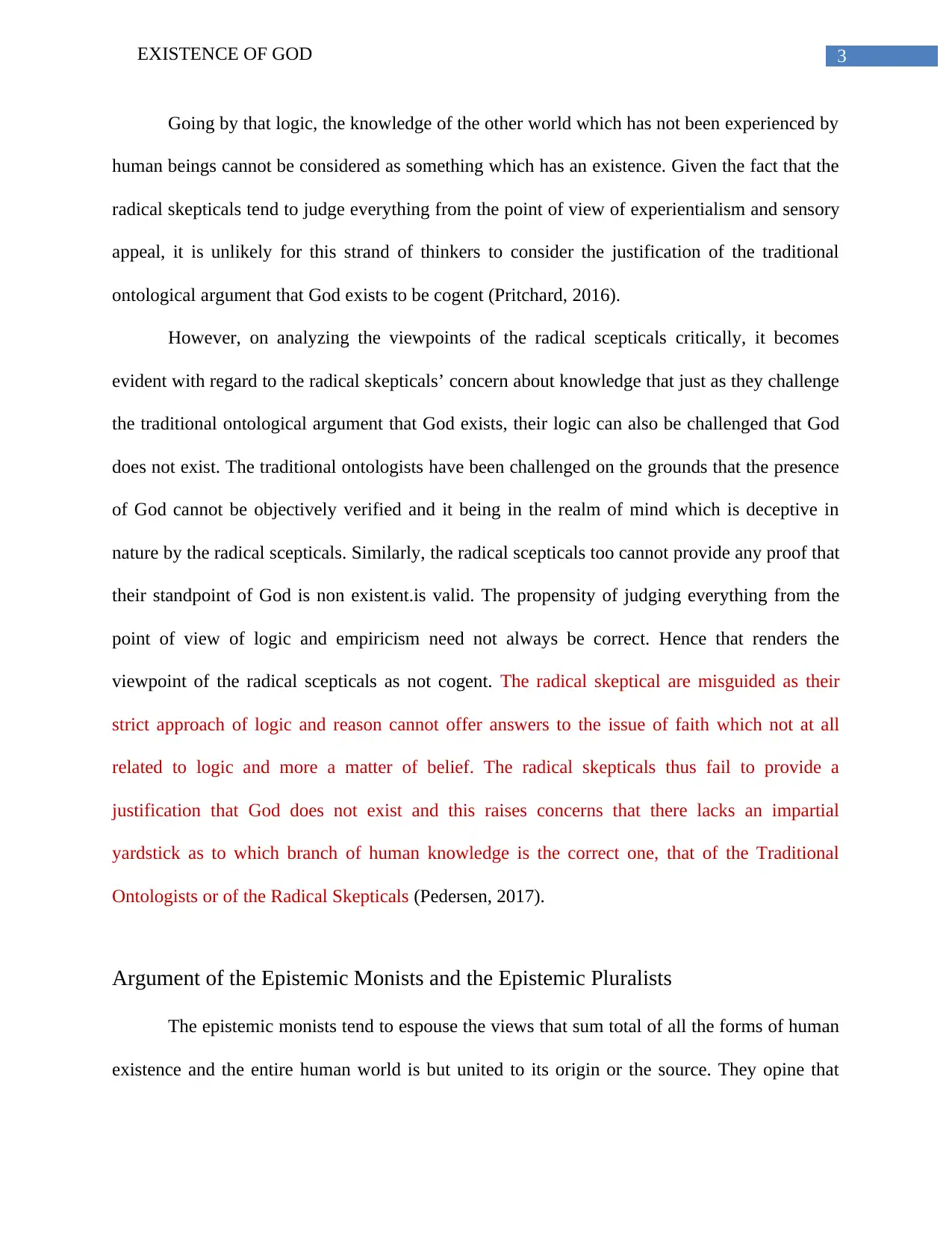
3EXISTENCE OF GOD
Going by that logic, the knowledge of the other world which has not been experienced by
human beings cannot be considered as something which has an existence. Given the fact that the
radical skepticals tend to judge everything from the point of view of experientialism and sensory
appeal, it is unlikely for this strand of thinkers to consider the justification of the traditional
ontological argument that God exists to be cogent (Pritchard, 2016).
However, on analyzing the viewpoints of the radical scepticals critically, it becomes
evident with regard to the radical skepticals’ concern about knowledge that just as they challenge
the traditional ontological argument that God exists, their logic can also be challenged that God
does not exist. The traditional ontologists have been challenged on the grounds that the presence
of God cannot be objectively verified and it being in the realm of mind which is deceptive in
nature by the radical scepticals. Similarly, the radical scepticals too cannot provide any proof that
their standpoint of God is non existent.is valid. The propensity of judging everything from the
point of view of logic and empiricism need not always be correct. Hence that renders the
viewpoint of the radical scepticals as not cogent. The radical skeptical are misguided as their
strict approach of logic and reason cannot offer answers to the issue of faith which not at all
related to logic and more a matter of belief. The radical skepticals thus fail to provide a
justification that God does not exist and this raises concerns that there lacks an impartial
yardstick as to which branch of human knowledge is the correct one, that of the Traditional
Ontologists or of the Radical Skepticals (Pedersen, 2017).
Argument of the Epistemic Monists and the Epistemic Pluralists
The epistemic monists tend to espouse the views that sum total of all the forms of human
existence and the entire human world is but united to its origin or the source. They opine that
Going by that logic, the knowledge of the other world which has not been experienced by
human beings cannot be considered as something which has an existence. Given the fact that the
radical skepticals tend to judge everything from the point of view of experientialism and sensory
appeal, it is unlikely for this strand of thinkers to consider the justification of the traditional
ontological argument that God exists to be cogent (Pritchard, 2016).
However, on analyzing the viewpoints of the radical scepticals critically, it becomes
evident with regard to the radical skepticals’ concern about knowledge that just as they challenge
the traditional ontological argument that God exists, their logic can also be challenged that God
does not exist. The traditional ontologists have been challenged on the grounds that the presence
of God cannot be objectively verified and it being in the realm of mind which is deceptive in
nature by the radical scepticals. Similarly, the radical scepticals too cannot provide any proof that
their standpoint of God is non existent.is valid. The propensity of judging everything from the
point of view of logic and empiricism need not always be correct. Hence that renders the
viewpoint of the radical scepticals as not cogent. The radical skeptical are misguided as their
strict approach of logic and reason cannot offer answers to the issue of faith which not at all
related to logic and more a matter of belief. The radical skepticals thus fail to provide a
justification that God does not exist and this raises concerns that there lacks an impartial
yardstick as to which branch of human knowledge is the correct one, that of the Traditional
Ontologists or of the Radical Skepticals (Pedersen, 2017).
Argument of the Epistemic Monists and the Epistemic Pluralists
The epistemic monists tend to espouse the views that sum total of all the forms of human
existence and the entire human world is but united to its origin or the source. They opine that
Paraphrase This Document
Need a fresh take? Get an instant paraphrase of this document with our AI Paraphraser
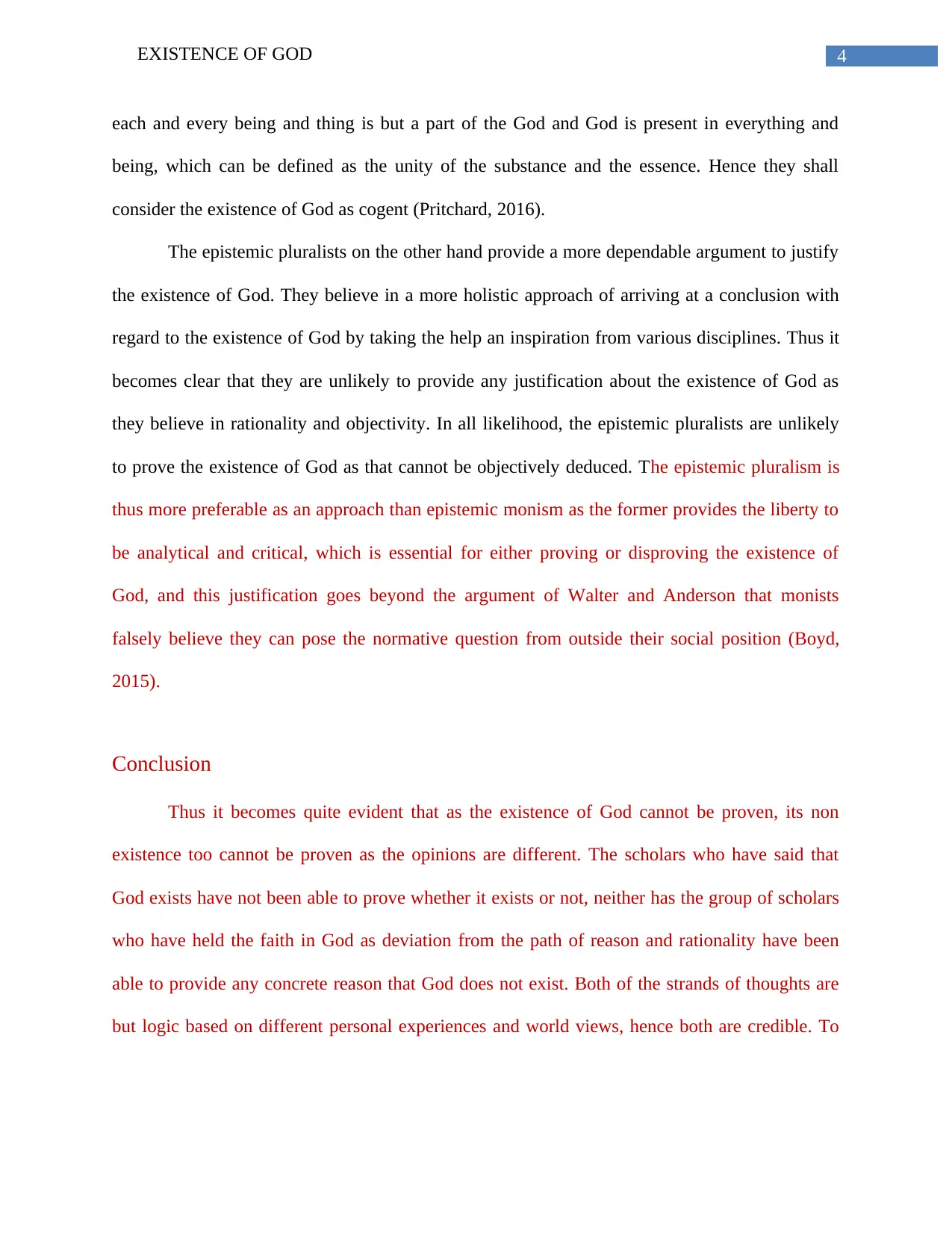
4EXISTENCE OF GOD
each and every being and thing is but a part of the God and God is present in everything and
being, which can be defined as the unity of the substance and the essence. Hence they shall
consider the existence of God as cogent (Pritchard, 2016).
The epistemic pluralists on the other hand provide a more dependable argument to justify
the existence of God. They believe in a more holistic approach of arriving at a conclusion with
regard to the existence of God by taking the help an inspiration from various disciplines. Thus it
becomes clear that they are unlikely to provide any justification about the existence of God as
they believe in rationality and objectivity. In all likelihood, the epistemic pluralists are unlikely
to prove the existence of God as that cannot be objectively deduced. The epistemic pluralism is
thus more preferable as an approach than epistemic monism as the former provides the liberty to
be analytical and critical, which is essential for either proving or disproving the existence of
God, and this justification goes beyond the argument of Walter and Anderson that monists
falsely believe they can pose the normative question from outside their social position (Boyd,
2015).
Conclusion
Thus it becomes quite evident that as the existence of God cannot be proven, its non
existence too cannot be proven as the opinions are different. The scholars who have said that
God exists have not been able to prove whether it exists or not, neither has the group of scholars
who have held the faith in God as deviation from the path of reason and rationality have been
able to provide any concrete reason that God does not exist. Both of the strands of thoughts are
but logic based on different personal experiences and world views, hence both are credible. To
each and every being and thing is but a part of the God and God is present in everything and
being, which can be defined as the unity of the substance and the essence. Hence they shall
consider the existence of God as cogent (Pritchard, 2016).
The epistemic pluralists on the other hand provide a more dependable argument to justify
the existence of God. They believe in a more holistic approach of arriving at a conclusion with
regard to the existence of God by taking the help an inspiration from various disciplines. Thus it
becomes clear that they are unlikely to provide any justification about the existence of God as
they believe in rationality and objectivity. In all likelihood, the epistemic pluralists are unlikely
to prove the existence of God as that cannot be objectively deduced. The epistemic pluralism is
thus more preferable as an approach than epistemic monism as the former provides the liberty to
be analytical and critical, which is essential for either proving or disproving the existence of
God, and this justification goes beyond the argument of Walter and Anderson that monists
falsely believe they can pose the normative question from outside their social position (Boyd,
2015).
Conclusion
Thus it becomes quite evident that as the existence of God cannot be proven, its non
existence too cannot be proven as the opinions are different. The scholars who have said that
God exists have not been able to prove whether it exists or not, neither has the group of scholars
who have held the faith in God as deviation from the path of reason and rationality have been
able to provide any concrete reason that God does not exist. Both of the strands of thoughts are
but logic based on different personal experiences and world views, hence both are credible. To

5EXISTENCE OF GOD
judge the rationalist perspective with the perspective of faith would be unjustified and unjust at
the same time.
judge the rationalist perspective with the perspective of faith would be unjustified and unjust at
the same time.
⊘ This is a preview!⊘
Do you want full access?
Subscribe today to unlock all pages.

Trusted by 1+ million students worldwide
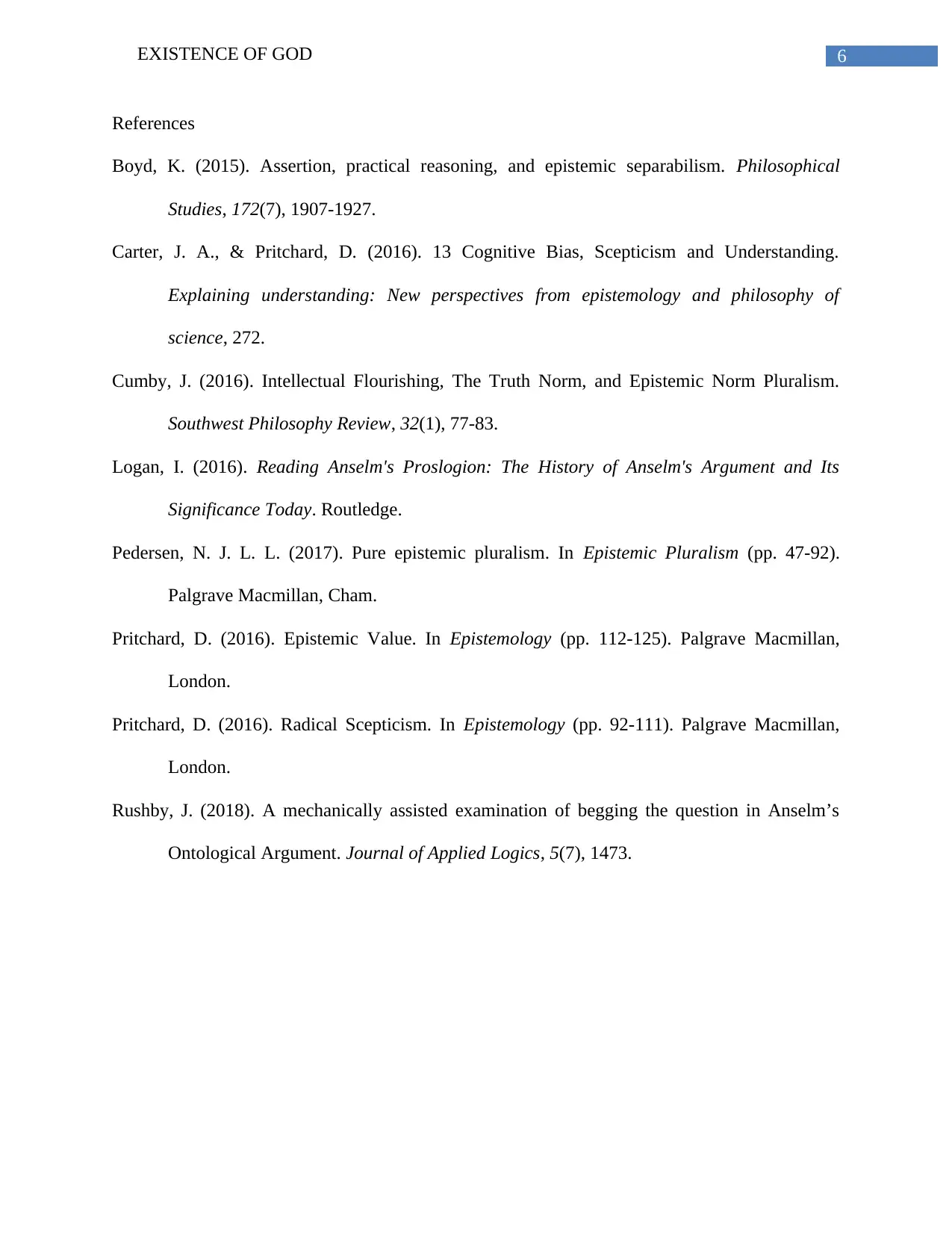
6EXISTENCE OF GOD
References
Boyd, K. (2015). Assertion, practical reasoning, and epistemic separabilism. Philosophical
Studies, 172(7), 1907-1927.
Carter, J. A., & Pritchard, D. (2016). 13 Cognitive Bias, Scepticism and Understanding.
Explaining understanding: New perspectives from epistemology and philosophy of
science, 272.
Cumby, J. (2016). Intellectual Flourishing, The Truth Norm, and Epistemic Norm Pluralism.
Southwest Philosophy Review, 32(1), 77-83.
Logan, I. (2016). Reading Anselm's Proslogion: The History of Anselm's Argument and Its
Significance Today. Routledge.
Pedersen, N. J. L. L. (2017). Pure epistemic pluralism. In Epistemic Pluralism (pp. 47-92).
Palgrave Macmillan, Cham.
Pritchard, D. (2016). Epistemic Value. In Epistemology (pp. 112-125). Palgrave Macmillan,
London.
Pritchard, D. (2016). Radical Scepticism. In Epistemology (pp. 92-111). Palgrave Macmillan,
London.
Rushby, J. (2018). A mechanically assisted examination of begging the question in Anselm’s
Ontological Argument. Journal of Applied Logics, 5(7), 1473.
References
Boyd, K. (2015). Assertion, practical reasoning, and epistemic separabilism. Philosophical
Studies, 172(7), 1907-1927.
Carter, J. A., & Pritchard, D. (2016). 13 Cognitive Bias, Scepticism and Understanding.
Explaining understanding: New perspectives from epistemology and philosophy of
science, 272.
Cumby, J. (2016). Intellectual Flourishing, The Truth Norm, and Epistemic Norm Pluralism.
Southwest Philosophy Review, 32(1), 77-83.
Logan, I. (2016). Reading Anselm's Proslogion: The History of Anselm's Argument and Its
Significance Today. Routledge.
Pedersen, N. J. L. L. (2017). Pure epistemic pluralism. In Epistemic Pluralism (pp. 47-92).
Palgrave Macmillan, Cham.
Pritchard, D. (2016). Epistemic Value. In Epistemology (pp. 112-125). Palgrave Macmillan,
London.
Pritchard, D. (2016). Radical Scepticism. In Epistemology (pp. 92-111). Palgrave Macmillan,
London.
Rushby, J. (2018). A mechanically assisted examination of begging the question in Anselm’s
Ontological Argument. Journal of Applied Logics, 5(7), 1473.
1 out of 7
Your All-in-One AI-Powered Toolkit for Academic Success.
+13062052269
info@desklib.com
Available 24*7 on WhatsApp / Email
![[object Object]](/_next/static/media/star-bottom.7253800d.svg)
Unlock your academic potential
Copyright © 2020–2026 A2Z Services. All Rights Reserved. Developed and managed by ZUCOL.


